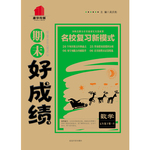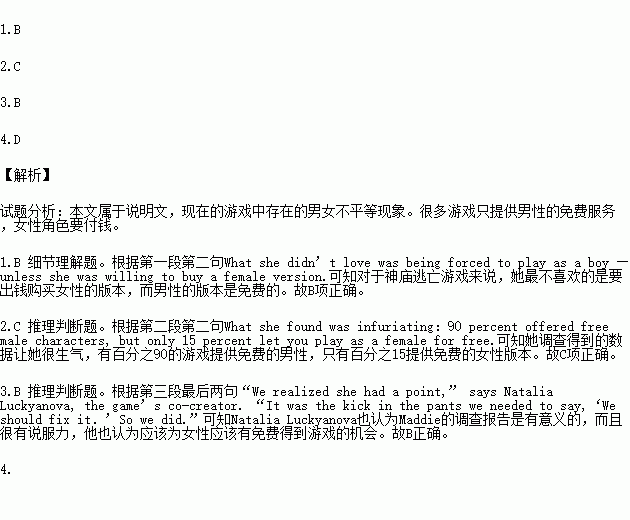题目内容
Maddie Messe, 13, has always loved Temple Run, a mobile game that sends her racing through swamps (沼泽) and forests to outrun a pack of crazed monkeys. What she didn’t love was being forced to play as a boy — unless she was willing to buy a female version. “I felt like l was being cheated or misrepresented,” Maddie explains.“Girls are just as capable (有能力的) of running away from monkeys as boys are.”
So last winter, Maddie researched 50 of the most popular iPhone games. What she found was infuriating:90 percent offered free male characters, but only 15 percent let you play as a female for free.
Armed with those statistics, Maddie drafted a spirited article and fired it off to several major newspapers. The Washington Post agreed to run the piece, which attracted millions of readers around the globe — including the makers of Temple Run! “We realized she had a point,” says Natalia Luckyanova, the game’s co-creator. “It was the kick in the pants we needed to say,‘We should fix it.’So we did.”
Now you can play Temple Run with a female character for free, but Maddie hopes her campaign inspires something deeper.“If you don’t see characters that look like you on TV or in movies or games, speak up! Just do your research first,”says Maddie. “One well-supported argument is much more effective than a million angry complaints.”
1.What did Maddie hate about Temple Run?
A. It had no female versions.
B. It charged for female versions.
C. Its female versions were too expensive.
D. Its female versions were not good enough.
2.Maddle’s findings_________.
A. pleased her B. cheated her
C. angered her D. comforted her
3.To Natalia Luckyanova, Maddie’s article sounded________.
A. amusing B. persuasive
C. impractical D. unreasonable
4.Maddie encourages readers to_________.
A. play mobile games within limits
B. write articles for major newspapers
C. respond to complaints in a proper way
D. do some research before making an argument
 期末好成绩系列答案
期末好成绩系列答案 99加1领先期末特训卷系列答案
99加1领先期末特训卷系列答案 百强名校期末冲刺100分系列答案
百强名校期末冲刺100分系列答案 好成绩1加1期末冲刺100分系列答案
好成绩1加1期末冲刺100分系列答案 金状元绩优好卷系列答案
金状元绩优好卷系列答案
